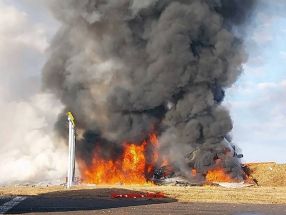Climate deal: World praises France's diplomatic efforts
LE BOURGET — Just a month after the Paris attacks, France has surmounted that atrocity to help achieve a seemingly unachievable triumph: uniting the world to seal a global climate pact.
The Paris climate agreement, adopted on Saturday, was the culmination of more than a year of intense diplomatic efforts by France. Delegates and foreign dignitaries cheered Foreign Minister Laurent Fabius, the host of the two-week talks, and gave him a standing ovation.
"It's rare in life to be able to move things forward at the planet level," Fabius said, visibly moved after coming out of the plenary room.
France is seen as the inventor of the concept of modern diplomacy, and this conference proved that the country is still a master of the art. Foreign officials highlighted Fabius' role in the success of the talks, heaping praise on him and France, which has a smaller diplomatic corps than the US and China.
"You have done a superb job as everybody has said," US Secretary of State John Kerry told Fabius on Saturday, expressing the Obama administration's "deepest gratitude to France."
EU climate chief Arias Canete said "France has united the world. This deal embodies the strength of the French nation." UN Secretary-General Ban Ki-Moon praised Fabius' "leadership."
Maldives Foreign Minister Thoriq Ibrahim, who chairs the Alliance of Small Island States, said the French made several smart moves, including having world leaders come in at the beginning of the talks — not at the end like in Copenhagen.
The 2009 conference in Denmark, which failed to deliver a climate deal, was on the minds of all negotiators as the worst case scenario.
"From the very beginning the French were conscious of the Copenhagen failure," Ibrahim said.
In a unique gathering, 151 heads of state headed to Paris to give a political push on the first day of the conference — just over two weeks after attacks claimed by Islamic State killed 130 people in Paris.
For more than a year, France had used its broad network of embassies —the third largest in the world— to work with governments abroad and keep them informed of the evolution of the negotiations.
French President Francois Hollande recalled that when he used to ask "where is Laurent Fabius" in the past year, he was answered: "he's in the plane because he's visiting all the countries of the world to build the agreement on climate."
Hollande himself became committed to a cause he once barely gave importance to — he had almost ignored environmental issues during his electoral campaign four years ago.
At every meeting with a foreign leader and during every visit abroad prior to the talks, Hollande remembered to mention the climate conference even when it was not front-page news.
During his visit to China last month, both countries released a strong joint agreement on climate they promoted as a signal to the world.
On Friday and Saturday, Hollande called several world leaders to help unlock the final sticking points. The French presidency refused to give the list of who he called.
The diplomatic success is a welcome victory for the unpopular Socialist government, as it faces a tough electoral challenge from the far right and conservatives yesterday. And it is a boost for France's global image as the country's economic weight has shrunk in recent years.
French organizers said they took inspiration from ideas successfully tested in previous conferences, such as Durban, South Africa, in 2011. For instance, they decided to use informal meetings called "Indaba," from a Zulu word that means "gathering."
They also closely worked with the Peruvian delegation following last year's Lima conference.
During the Paris conference, France devoted a team of 60 to 80 permanent staff to follow every meeting, and coordinate and facilitate the talks for 24 hours a day.
When talks entered a difficult stage in the last few days, the French organizers became "very procedural" in order to avoid having last-minute snags, a French official said, describing a "laborious" process — and very little sleep.
To solve tensions between specific countries, "We suggested they gather in small groups to try to find a compromise and we told them: 'come back in two hours with a proposal,'" the official said on condition of anonymity because he wasn't authorized to disclose the details of the negotiations.
When Fabius announced a one-day delay for the final text to be presented and detailed the working method, the delegates applauded.
"I think the French have been playing this incredibly well," said Jennifer Morgan, global climate program director for the World Resources Institute. "It took hard work, grit and guts, but countries have finally united around a historic agreement that marks a turning point on the climate crisis."
- Latest
- Trending































